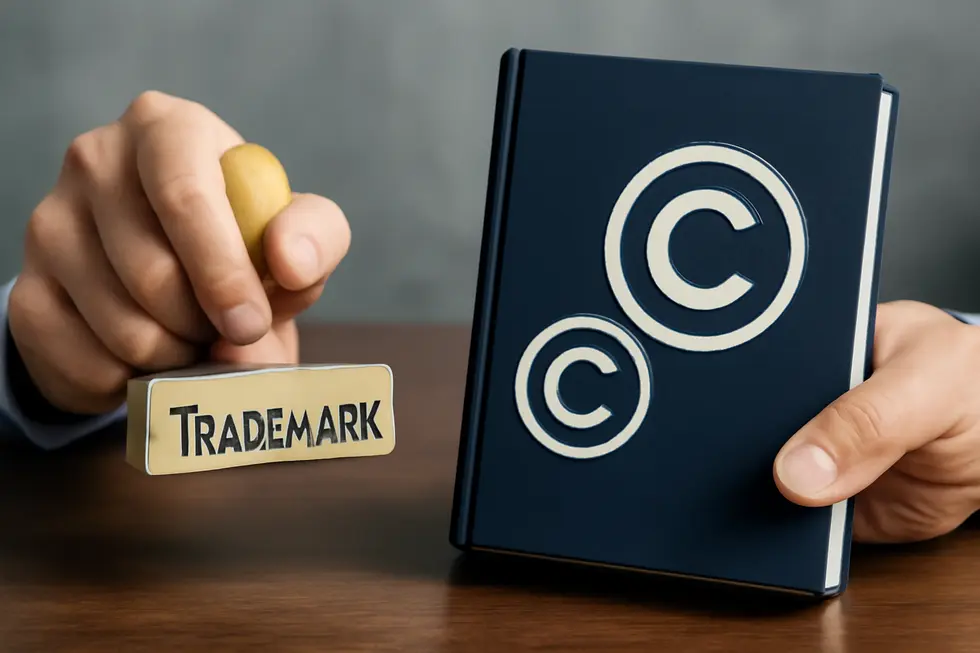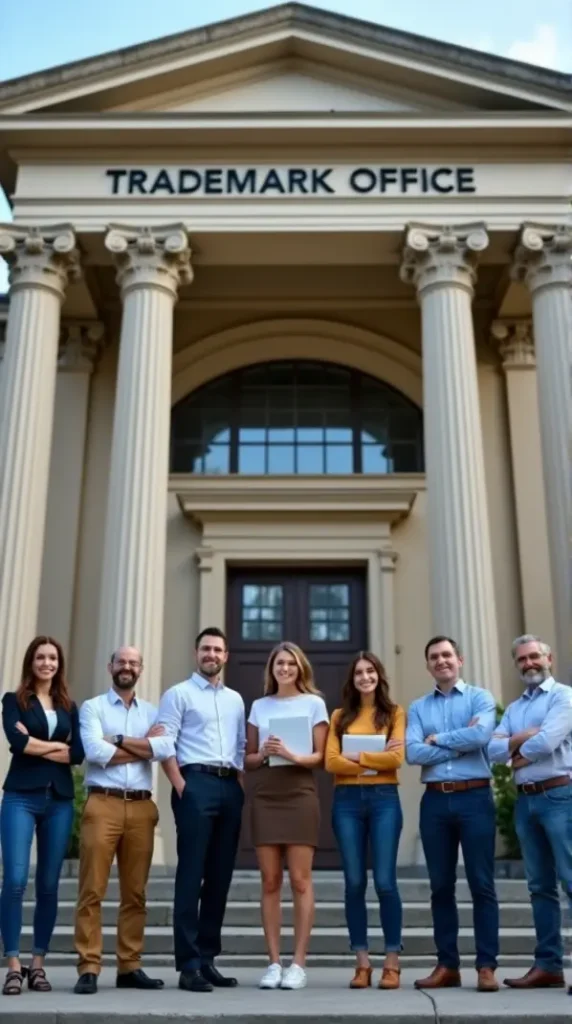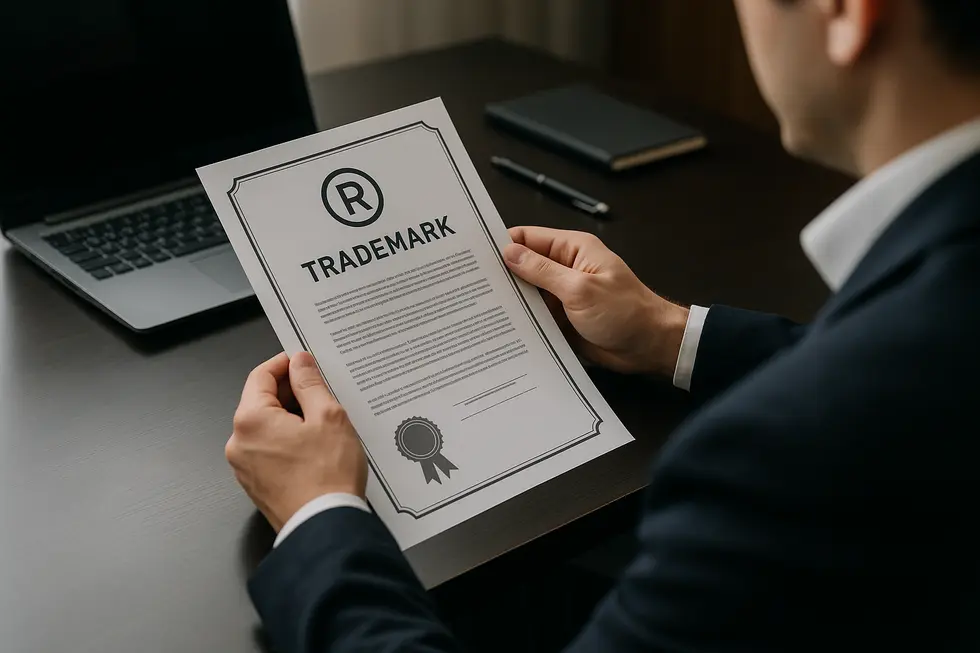Introduction
Understanding the protections available for words is essential for business owners aiming to safeguard their brand identity. Many entrepreneurs wonder if a single word can be copyrighted to prevent competitors from using it. The answer lies in differentiating between copyright and trademark laws, as each serves distinct purposes in protecting creative content and business identifiers. This article explores the boundaries of copyright in relation to words, contrasts copyright with trademark protections, and outlines the practical legal measures business owners can take to protect their words and brands effectively. By examining these key areas, business owners will gain clarity on how to best protect the valuable elements of their business identity.
Tables of Contents
Chapter 1: Understanding Copyright Limitations: Can You Copyright a Word?
- The Legal Divide Between Copyright and Trademark: Why Words Are Not Copyrighted but Can Be Trademarked
- Why Single Words Aren’t Copyrightable: Exploring Originality and Fixation in Copyright Law
- Protecting Words Beyond Copyright: How Trademarks Secure Brand Identity
Chapter 2: Trademark Protection versus Copyright: Can You Copyright a Word?
- Why Single Words Resist Copyright but Thrive Under Trademark Law
- Why Trademark, Not Copyright, Holds the Key to Protecting Words in Commerce
- Why Trademark, Not Copyright, Is the Key to Protecting Words in Commerce
Chapter 3: Legal Implications: Can You Copyright a Word and How to Protect It
- Why Copyright Fails to Protect Words and How Trademarks Fill the Gap
- Harnessing Trademark Law to Protect Words as Valuable Brand Assets
- Securing and Enforcing Trademark Rights: Protecting a Word Beyond Copyright
Chapter 1: Understanding Copyright Limitations: Can You Copyright a Word?

1. The Legal Divide Between Copyright and Trademark: Why Words Are Not Copyrighted but Can Be Trademarked
Copyright law is designed to protect original creative works that express ideas fixed in a tangible form, such as books, music, films, and artwork. However, this protection does not extend to individual words, short phrases, or names. These elements are viewed as basic building blocks of language and are therefore excluded from copyright eligibility. The rationale is that copyright safeguards the unique expression of ideas, not the underlying ideas themselves or commonly used words.
Instead, the realm of protecting words—especially when they serve to identify and distinguish goods or services—falls under trademark law. Trademarks grant exclusive rights to use specific words, slogans, or logos in commerce, preventing others from adopting confusingly similar identifiers in related markets. This legal framework aims to protect brand identity and consumer recognition rather than creative expression.
The distinction between copyright and trademark is fundamental. Copyright covers original works such as novels, songs, or paintings, focusing on protecting artistic expressions. Trademark protection centers on brand identifiers like names and logos that signal the source of products or services. For example, a single word that serves as a brand name can be trademarked, giving its owner the exclusive right to use it commercially within its class of goods or services.
If your goal is to safeguard a word as a business identifier, pursuing trademark registration is essential. Copyright might protect the creative work where the word appears, but it will not protect the word itself. This clear legal separation is crucial for understanding the proper intellectual property protection avenues available.
For further insight into how trademarks and copyrights differ, the LegalZoom explanation on trademarks vs. copyrights offers accessible, detailed guidance.
2. Why Single Words Aren’t Copyrightable: Exploring Originality and Fixation in Copyright Law
Copyright law is designed to protect original works of authorship that are fixed in a tangible medium, such as a book, song, painting, or software. This protection safeguards the particular expression of ideas rather than the abstract ideas themselves or isolated components like individual words. A crucial reason why single words cannot be copyrighted lies in the requirements of originality and fixation. A solitary word typically lacks the minimal creative spark necessary to be considered original; it does not embody a unique expression but rather functions as a building block of language.
Moreover, fixation requires that a work be captured in a physical or digital form sufficiently stable to be perceived and reproduced. While a word may be written or printed, the word itself—apart from the surrounding creative context—is not a work but a linguistic unit without distinctive creative authorship. For example, a novel’s copyright protects the story and its original presentation as a complete work, but not each individual word used in the narrative.
It’s important to distinguish that copyright’s focus on expressive works excludes single words, names, or short phrases, as these elements do not meet both originality and fixation criteria independently. However, when a word serves as a brand identifier, trademark law becomes the appropriate legal tool, offering protection by preventing other businesses from using confusingly similar marks in commerce. This legal boundary between copyright and trademark helps to clarify what intellectual property rights cover.
For further insight into the scope of copyright protection across different media, the U.S. Copyright Office guidelines provide comprehensive explanations. Additionally, more about the distinctions between copyright and trademark protections can be explored in intellectual property resources like brand trademark business protection.
3. Protecting Words Beyond Copyright: How Trademarks Secure Brand Identity
While copyright law offers crucial protection for original creative works, it does not extend to individual words, names, or short phrases. This limitation exists because copyright safeguards the expression of ideas fixed in a tangible medium, such as novels, paintings, or musical compositions—not isolated words themselves. Since single words lack the originality and fixation required for copyright protection, they fall outside its scope.
However, words can still receive legal protection—in a different form—through trademark law. Trademarks are designed to protect words, phrases, symbols, or designs that identify and distinguish the source of goods or services in commerce. When a word is used as a brand identifier, trademark registration grants the owner exclusive rights to use that word in connection with specific products or services. This prevents competitors from employing confusingly similar marks, thereby preserving brand integrity and consumer recognition.
For example, a distinctive word used consistently as a product or business name can qualify for trademark protection, even though that word itself cannot be copyrighted. This distinction highlights the complementary roles copyright and trademark laws play: copyright protects creative expressions, while trademarks ensure consumers can reliably identify the origin of goods or services.
Therefore, if your goal is to secure legal rights over a word used commercially to represent your brand, pursuing trademark registration is the appropriate step. This approach aligns with the intent and limits of intellectual property protections and helps maintain exclusive use and marketplace clarity.
For a deeper understanding of how trademarks function to secure your business identity, consider exploring resources on legal brand protection through trademarks.
Externally, the U.S. Copyright Office clearly states that copyright does not protect single words or short phrases but focuses instead on original works of authorship fixed in a tangible form.
Chapter 2: Trademark Protection versus Copyright: Can You Copyright a Word?

1. Why Single Words Resist Copyright but Thrive Under Trademark Law
Understanding why single words cannot be copyrighted requires grasping the fundamental purpose of copyright law. Copyright protects original creative expressions fixed in a tangible medium—such as books, songs, or paintings—not individual elements like words or short phrases. The law distinguishes between protecting the expression of ideas and the ideas or building blocks themselves. Since words function primarily as language tools or building blocks, they fall outside copyright’s scope.
Instead, trademark law provides the proper channel for protecting words when used to identify and distinguish goods or services in the marketplace. Trademarks safeguard brand identity elements, including words, logos, slogans, or designs that signal the source of products or services to consumers. This protection helps prevent confusion and unfair competition by giving exclusive rights to those distinctive marks.
While copyright arises automatically upon creation of an original work, trademarks often require registration to enforce rights, though some protection begins through actual commercial use. Trademark rights can be maintained indefinitely with renewals, contrasting with the fixed duration of copyright protection tied to the author’s lifetime plus decades.
For example, a word like “Coca-Cola” is shielded by trademark as a brand name but not by copyright. Conversely, the original story of a novel or the lyrics of a song where words appear are copyright-protected as creative expressions but not the individual words themselves. This distinction clarifies why seeking trademark registration is essential to guard a word or phrase as a business identifier.
For businesses aiming to protect their brand names or slogans, focusing on trademark law ensures appropriate legal coverage. Comprehensive guidance on trademark registration and brand protection strategies can be found at Trademark Your Business Name. Further insights on the legal boundaries of copyright versus trademark support smart decisions in intellectual property safeguarding. More detailed official information is also available from the U.S. Copyright Office.
Understanding this clear divide supports informed choices about protecting words and creative works effectively.
2. Why Trademark, Not Copyright, Holds the Key to Protecting Words in Commerce
Copyright law does not extend to individual words or short phrases. Instead, it safeguards original creative works fixed in a tangible medium, such as books, music, and artwork. Words themselves, being common building blocks of language, lack the originality and fixed creative expression needed for copyright protection. This fundamental limitation highlights why copyright cannot protect a single word or even brief combinations of words used alone.
In contrast, trademark law offers a robust mechanism for protecting words that function as brand identifiers. When a word is used in commerce to signify the source of goods or services, it can acquire distinctiveness, making it eligible for trademark protection. This distinctiveness is crucial: generic terms cannot be trademarked because they describe a category of products rather than a specific source. For example, the word “Candy” alone is too generic to trademark, whereas a unique, coined term or a descriptive word that consumers associate exclusively with a single business can achieve this status.
The purpose of trademarks is to prevent consumer confusion by clearly identifying the origin of products or services. This protection extends to brand names, slogans, and logos that distinguish one business from another in the marketplace. Unlike copyright, trademarks require active use in commerce and often registration to ensure stronger legal rights. Owning a trademark empowers a business to stop others from using confusingly similar words or symbols, protecting brand identity and market reputation.
In practice, this means if you want to protect a word as part of your brand, pursuing trademark registration is the effective path. While copyright automatically applies to creative works, trademark protection centers on the commercial function and distinctiveness of the word in identifying your business offerings. For a deeper exploration of how trademarks safeguard brand identity, see how trademark prevents others.
For authoritative guidance on the nuances of copyright protection, refer to the U.S. Copyright Office’s explanations, which clarify that copyright focuses on original creative expressions and does not cover mere words or short phrases [1][3]. This understanding helps delineate the clear boundaries between copyright and trademark in intellectual property law.
Sources: [1] U.S. Copyright Office; [2] USPTO; [3] U.S. Copyright Office; [4] USPTO guidelines; [5] Trademark legal framework.
3. Why Trademark, Not Copyright, Is the Key to Protecting Words in Commerce
Copyright law fundamentally protects the original expression of ideas fixed in a tangible medium, such as books, music, or artwork. However, it does not extend its coverage to single words or short phrases because these elements are considered basic building blocks of language rather than creative expressions. This limitation means that a solitary word, no matter how distinctive, cannot be copyrighted. Instead, securing exclusive rights to a word that identifies a business, product, or service falls under trademark law, which plays a critical role in commerce by protecting brand identifiers.
Trademarks cover words, names, logos, slogans, or any symbols that distinguish one company’s goods or services from another’s. Unlike copyright, trademark protection requires that the word or phrase is actively used in commerce to indicate the origin of goods or services. This commercial use links the trademark to consumer recognition, granting its owner the exclusive right to prevent others from using confusingly similar marks that could mislead customers. Importantly, trademark rights can be solidified through registration with the United States Patent and Trademark Office (USPTO), which offers significant advantages like nationwide protection and the ability to enforce claims in federal court.
A familiar example illustrates this distinction: while no one can copyright the word “Nike,” the term is protected as a trademark identifying the company’s products. Similarly, the Nike “swoosh” logo benefits from trademark protection as a distinctive brand symbol. For business owners aiming to safeguard their brand’s identity, pursuing trademark registration is essential, because copyright will only shield the creative works surrounding that word (like marketing materials), never the word itself.
Understanding this separation helps businesses navigate intellectual property rights effectively, ensuring their brand names and slogans are legally protected in the marketplace without misapplying copyright law. For additional guidance on the trademark registration process and its distinctions from copyright, resources such as Cover Your Assets’ comprehensive overview provide detailed explanations.
Chapter 3: Legal Implications: Can You Copyright a Word and How to Protect It

1. Why Copyright Fails to Protect Words and How Trademarks Fill the Gap
Copyright law is designed to protect original creative expression fixed in a tangible medium, such as novels, songs, films, or artwork. However, it expressly excludes individual words, short phrases, names, and titles from protection because these elements are considered too minimal to qualify as original works. This exclusion stems from the idea-expression dichotomy central to copyright: only the unique creative expression of an idea can be copyrighted, not the idea itself or its simplest verbal components.
As a result, trying to secure copyright protection for a single word is futile since copyright covers the structure, arrangement, or creative content of a work, not isolated linguistic units. Words on their own lack the originality and fixed form that copyright requires. For businesses or individuals seeking to protect a unique word or phrase related to their products or services, trademark law offers a suitable alternative. Trademarks grant exclusive rights to identify and distinguish goods or services through distinctive words, symbols, logos, or slogans.
Registering a trademark with the United States Patent and Trademark Office (USPTO) legally binds others from using confusingly similar marks in commerce, thereby protecting brand identity and consumer recognition. Unlike copyright, trademarks are not automatic upon creation; they require registration and ongoing use to maintain protection. This specialization of trademark law effectively safeguards words and phrases as commercial markers rather than as literary or artistic expressions.
Understanding this distinction is crucial for proper intellectual property strategy. While copyright protects creative works such as books or music comprehensively and automatically once fixed, it does not extend to protecting the building blocks of language. Instead, trademark registration should be pursued to secure exclusive rights over words used in trade contexts. For more detailed information about the differences and how to protect your intellectual property, see the basics of copyright law resource that clarifies copyright limitations and appropriate protections.
2. Harnessing Trademark Law to Protect Words as Valuable Brand Assets
While copyright law explicitly excludes protection for individual words or short phrases, trademark law offers a potent alternative to safeguard words in a commercial context. Unlike copyright, which protects original creative works fixed in tangible form, trademarks are designed to identify and distinguish the source of goods or services, granting legal rights over words, names, symbols, slogans, and even distinctive sounds or colors used in commerce. To protect a word as a trademark, it must be employed in the marketplace as a brand identifier linked to specific products or services. This commercial use establishes its role in signaling the origin of those offerings to consumers.
Registration of a trademark with authoritative bodies like the United States Patent and Trademark Office (USPTO) is highly advisable, though not strictly mandatory. Federal registration creates a public record of the mark, lending enhanced legal protections and enabling the owner to pursue infringement claims in federal courts. Without registration, some common law rights may exist, but they are generally more limited and geographically constrained. Effective trademark protection relies on maintaining distinctiveness and actively monitoring potential unauthorized uses. Enforcement typically begins with a cease-and-desist letter to address infringing parties, followed by litigation if necessary. Courts assess infringement primarily based on the likelihood of consumer confusion, ensuring that distinctiveness and brand integrity are preserved.
Trademark law also recognizes important defenses such as fair use and geographic specificity, balancing brand owners’ rights with free expression and competition. This framework makes trademark protection the optimal legal tool for securing exclusive rights over words used as business identifiers. For a deeper understanding of how trademarks operate within business contexts and why they are essential, exploring resources like legally protected brand trademarks can provide valuable insights. Further detailed guidance on the nuances of trademark registration and enforcement can be found through external resources.
3. Securing and Enforcing Trademark Rights: Protecting a Word Beyond Copyright
Unlike original creative works, single words cannot be copyrighted because copyright law safeguards the expression of ideas rather than isolated terms. Instead, protection for a word used in commerce primarily comes through trademark law, which grants exclusive rights to words, names, or symbols that identify and distinguish goods or services. To protect a word effectively, the first essential step is to conduct a thorough trademark search. This ensures the desired word is not already federally registered or in use, avoiding costly conflicts.
Once cleared, registering the word with the United States Patent and Trademark Office (USPTO) provides nationwide protection and legal tools against infringement. Trademark registration offers the owner exclusive rights to use the word in connection with specified products or services, establishing a strong basis for enforcement if others attempt unauthorized use.
Maintaining and enforcing these rights requires vigilant monitoring of the marketplace for potential infringements. Consistent use of the trademark in commerce is critical; this includes using proper trademark symbols and applying the mark to products or marketing materials. When infringement occurs, initial measures such as sending cease-and-desist letters are often effective in resolving disputes without litigation. However, should these attempts fail, legal action with assistance from an intellectual property attorney may be necessary to protect the mark.
Besides registration and enforcement, practical strategies include utilizing confidentiality agreements when sharing sensitive brand information and seeking expert legal counsel to guide through licensing agreements or litigation proceedings. These measures safeguard the word’s value as a distinctive identifier in business.
For a detailed breakdown on trademark protections and enforcement strategies, official resources like the USPTO’s guidelines or consulting an experienced IP attorney are invaluable. This approach ensures a word’s commercial identity is properly secured and defended, complementing the inherent limitations of copyright law.
For more on how trademarks protect your business identity, see legally protected brand trademark.
Final thoughts
Words alone cannot be copyrighted because copyright law protects original creative expressions fixed in a tangible medium, such as books or artwork—not individual words or short phrases. For business owners, this distinction is crucial: a word that identifies a product or service should be protected through trademark law rather than copyright. By securing a trademark, businesses gain exclusive rights to use specific words in commerce, helping them build and defend their brand identity. Understanding these protections empowers business owners to take informed legal steps, protecting their brand’s unique identifiers effectively in a competitive marketplace. Being proactive in trademark registration is the best path forward to safeguard your business’s most valuable assets.
Get your trademark today! Thousands have protected their brand by filing a trademark. What are you waiting for? Start your trademark application!
About us
The globe’s top website for registering trademarks and safeguarding your brand, name, logo, or slogan. We provide easy and reliable access to the trademark registration process, helping business owners protect what matters most—their unique identity and competitive edge.







